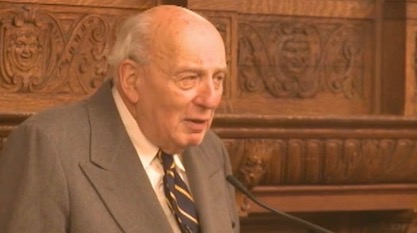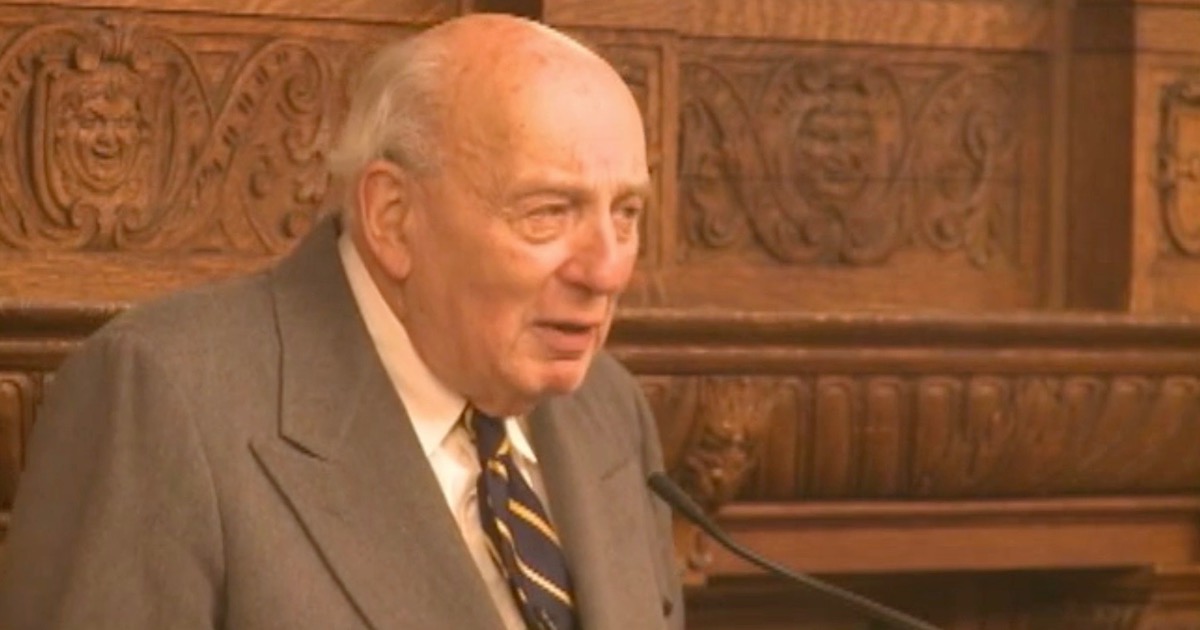 Evolution
Evolution
Farewell to John Lukacs: A Great Historian, and an Unequivocal Darwin Doubter


John Lukacs’s death at 95, reported yesterday, ends the career of a historian best known for his thoughtful and thought-provoking work on World War II in general and Winston Churchill in particular. In the past, I have written approvingly of this master wordsmith (here and here). So it is perhaps fitting that I compose a few words of heartfelt farewell for a historian I have long read and respected.
Although the Associated Press refers to him as “an iconoclast who brooded over the future of Western Civilization,” he had much to say to this generation and it would be a mistake to dismiss him as merely an old curmudgeon. Fact is, Lukacs brooded over Western civilization with much to brood about as any careful reading of his fascinating At the End of an Age (2002) will reveal. Kenneth R. Gaarder’s review in Psychiatry called its author “a lucid thinker…[who] presents many arguments that are hard to refute.”
Not Arrogant but Anxious
Lukacs’s more recent works, History and the Human Condition (2013) and We at the Center of the Universe (2016), reveal his deep and abiding respect for humanity, with a profoundly Catholic spirit (in both senses of that word). Although Lukacs was not an ID proponent (even criticizing it on occasion), there was much in his scholarship that readers of Evolution News would appreciate. He was an unequivocal Darwin doubter. Although Darwin chided humanity for its arrogance in thinking it was the center of the universe, Lukacs threw this claim squarely back at Darwin. He insisted that an anthropocentric view of the universe
is not arrogant or stupid. To the contrary: it is anxious and modest. Arrogance and stupidity, or at best shortsightedness, are the conditions of those who state that what human beings have figured out (most of these figurations occurring during the past 500 years, a very short period in the history of mankind!) . . . that these are eternally valid facts or truths even before the universe existed and even if and when our world or, indeed, the universe will cease to exist. No. The known and visible and measurable conditions of the universe are not anterior but consequent to our existence and to our consciousness. The universe is such as it is because in the center of it there exist conscious and participant human beings who can see it, explore it, study it. (For those readers who believe in God: the world and this earth were created by Him for the existence and consciousness of human beings.) This insistence on the centrality and uniqueness of human beings is a statement not of arrogance but of humility. It is yet another recognition of the inevitable limitations of mankind.
Lukacs here echoes one of his most beloved kindred spirits, C.S. Lewis’s close friend and confidant Owen Barfield, especially his Saving the Appearances: A Study in Idolatry.
Darwinism’s Inherent Nihilism
Unlike many of his academic colleagues, Lukacs did not stand in awe and wonder of Charles Darwin. He recognized the inherent nihilism in Darwinism. Observing that “monkeys resembled men more than, say, minnows was, of course, no intellectual feat,” but he added,
perhaps the essential fault of Darwinism is its implicit denial that there is any fundamental difference, no matter how physically slight, between human beings and all other living beings. One need not be a religious believer to struggle against this: for if there is really no essential difference between human beings and all other living creatures, then there is no reason to have laws and institutions and mores prohibiting certain human acts and protecting human dignity, indeed, human lives.
The Good Fight
Although he has left us, we still have his books and articles. Thus, even in death, he can still teach us, if only to protect us against ourselves. I could say much more about Lukacs’s rich philosophy of history, its thoughtful correspondences between science and the humanities, and its deep commitment to personalism, not unlike that of Cardinal Newman. But I write not to exposit but to say good-bye. John Lukacs, truly you can say with Paul, “I have fought the good fight, I have finished the race, I have kept the faith.”
Photo: John Lukacs speaking in 2009 at Eastern University, via YouTube (screen shot).
